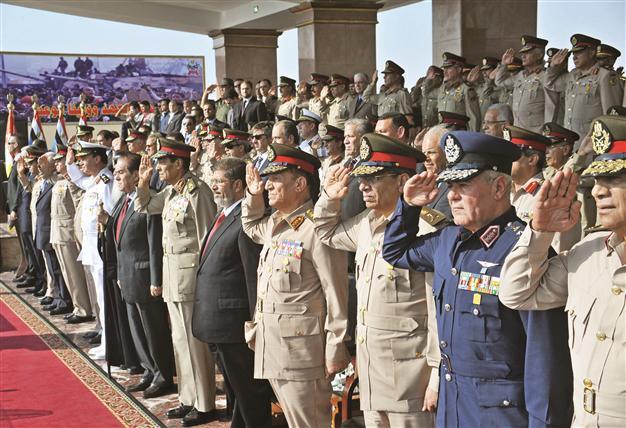Morsi takes helm amid pressure
CAIRO

Egyptian President Morsi (C) poses next to the military council chief Field Marshal Hussein Tantawi and other ruling military generals during a ceremony at a military base in Cairo. Morsi was sworn in as Egypt’s first freely elected civilian president on June 30. AFP photo
Egyptian President Mohamed Morsi began his first full day in office yesterday, but with his powers sharply circumscribed by the military that has ruled since Hosni Mubarak was ousted from power last year.After being sworn in as the country’s first freely elected civilian president on June 30, Morsi formally received a transfer of power and pledge of support from the military. But the 60-year-old’s swearing-in ceremony took place at the constitutional court in Cairo, despite Morsi’s wish that it take place before the now disbanded Islamist-led Parliament.
The military dissolved Parliament last month following a court order in what the powerful Muslim Brotherhood, from which Morsi stood down after his election, described as a “soft coup.” In the handover at Cairo’s Hike Step base, Field Marshal Hussein Tantawi, the head of the Supreme Council of the Armed Forces (SCAF), vowed to support Morsi. “We will stand with the new president, elected by the people,” Tantawi said in a speech after an honor guard parade and a helicopter fly past. He bestowed upon the new president the highest military honor, “the shield of the armed forces,” and Morsi thanked the military, also pledging to support it.
Netanyahu sends letter, Abbas calls
“I accept the transfer of power,” Morsi said at the same base where members of the once-banned Brotherhood had faced military trials under Mubarak. However, the ritual masked a political impasse ripe for future confrontation.
The SCAF assumed legislative powers after it disbanded Parliament and also formed a powerful national security council headed by the president but dominated by the generals. The military also reserves the right to appoint a new constituent assembly should the one elected by the old Parliament be disbanded by a court decision expected on September 1. The Brotherhood insists that only Parliament can appoint the assembly. After taking the oath of office on Saturday, Morsi in a speech at Cairo University pointedly mentioned the “elected Parliament” several times and said the army should resume its normal role. “The elected institutions will return to fulfilling their roles. And the great military will devote itself to the task of protecting the country,” Agence France-Presse quoted him as saying.
Servant of the people
He also put forward several of his international and domestic objectives, saying he would be a “servant of the people” in a “democratic, modern and constitutional state.” Internationally, Morsi has repeated that Egypt, the first Arab nation to make formal peace with Israel, would respect its international treaties, in an allusion to the 1979 accord and said Egypt would back the Palestinians.
An Israeli source said yesterday that Prime Minister Benjamin Netanyahu had written to Morsi urging him to uphold the 1979 peace accord and wishing him good luck. The letter stressed Israel’s desire to continue cooperation and to strengthen the peace, an Israeli source said on condition of anonymity.
As president, he is not expected to radically change Egypt’s foreign policy, especially toward Israel, in which the military is expected to exercise its clout. Morsi also received a call from Palestinian leader Mahmoud Abbas, who thanked him for supporting the Palestinians, official Egyptian MENA news agency reported.
















